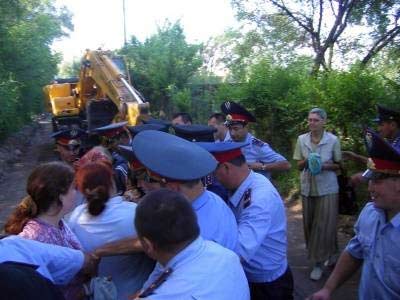Kazakh Lawmakers Approve Restrictive Religious Bill
By | Jun 14, 2008

ALMATY, Kazakhstan: Kazakhstan’s parliament tentatively approved a bill Wednesday intended to increase government control over the activities of religious associations.
The bill has drawn protests from rights groups, which say the changes will hinder religious minorities and could force some of them out of existence.
Under the proposed rules, missionary activities would be curtailed and fines for unregistered religious organizations sharply increased. The bill also would restrict the right to publish religious literature to a limited number of approved organizations.
Groups that are already registered would have to go through the procedure again.
“This bill will destroy all freedoms of conscience,” said Ninel Fokina, head of the Almaty Helsinki Committee. “It bears no relation to the country’s constitutional norms and to our obligations before the international community.”
Lawmaker Kamal Burkhanov said the bill was drafted in the spirit of international democratic standards.
“We have 47 different confessional denominations in Kazakhstan, but in order for them not to disturb each other’s work we have decided to put the system in order,” said Burkhanov, who chairs a working group on the bill.
Kazakhstan submitted the proposed bill to the Organization for Security and Cooperation in Europe for scrutiny last month, but Burkhanov said the group had not yet voiced its findings.
The OSCE’s Office for Democratic Initiatives and Human Rights said it sent its review to Kazakh authorities Tuesday evening and that further consultations will be held later this month.
Before the bill receives presidential approval, it must pass a second reading in parliament and then be scrutinized by the upper chamber and a constitutional review committee.
Kazakhstan has sought in recent years to convey the image of religious tolerance to the world. But human rights activists say its laws on religion have hampered freedom of conscience.
The oil-rich Central Asian nation hosted an international forum on religious rights in 2006, swiftly building a 77-meter (250-foot) glass pyramid-shaped venue costing more US$65 million (€42 million) in the capital, Astana, in time for the meeting.
But observers say constant changes to the law regulating religious organizations have seriously harmed minority faiths.
“Restrictions are tighter, controls are more intrusive, and those that want to peacefully practice their faith in conditions the government doesn’t like face more and more restrictions,” said Felix Corley, editor of Forum 18, a Norwegian-based religious freedom advocacy group.
Amendments passed in 2005, ostensibly aimed at addressing concerns about national security, required all religious activity to be registered. The OSCE condemned the measures as a breach of Kazakhstan’s commitments on freedom of association, religion and expression.
Earlier this year, 82-year old Baptist pastor Yegor Prokopenko was fined 29,200 tenge (US$240, €155) by a court in eastern Kazakhstan for refusing to register his group. Baptist pastors remain adamant that even the prospect of stiffer penalties will not change their position.
“We consider all requirements to register as an interference in our affairs,” said fellow Baptist pastor Dmitry Jantsen. “We lived in the Soviet Union and we know perfectly well what registration is all about.”















